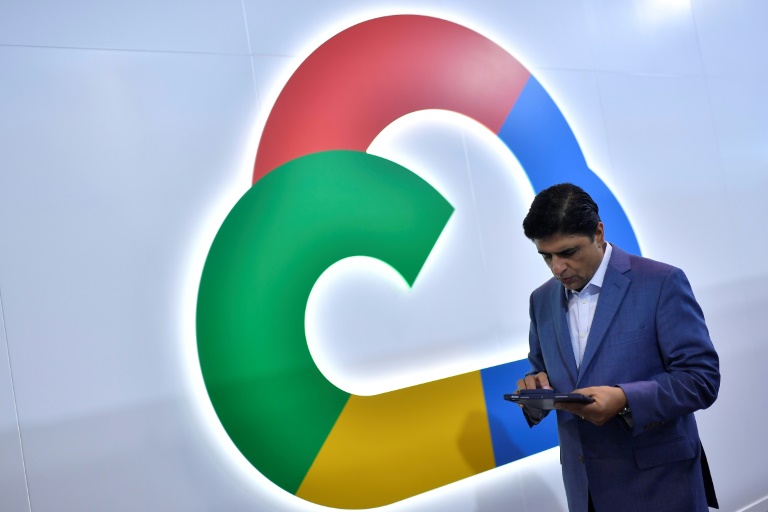SOCIAL
Google accused of taking user data to trains its AI: A case for the defence?

Google is dabbling with letting developers, hospitals, car makers and others use its Cloud computing platform to tap into generative artificial intelligence capabilities like those causing a buzz in ChatGPT – Copyright AFP Sam Yeh
A recent lawsuit has been enacted against Google. The lawsuit alleges that the tech giant stole from millions of U.S. people in order to train its artificial intelligence products.
The class-action suit was filed during August 2023 against Google and its parent company Alphabet. The action was brought by Clarkson Law Firm. The firm previously filed a similar suit against ChatGPT-maker OpenAI during July 2023.
Jennifer Coates is a partner at international law firm Dorsey & Whitney who represents high-profile and government entities in complex litigation cases. She previously served as an Assistant Attorney General with the Office of the Minnesota Attorney General, which she has represented regulatory agencies in state and federal courts and regularly advises clients on data privacy, risk management and cybersecurity matters.
Of the recent class action lawsuit against Google, Coates explains to Digital Journal that the lawsuit does not stand a great chance of success. This is based on the following premise: “The United States is not going to prohibit an individual from going to a library and reading whatever they want. The thoughts that the individual generates from that reading and learning are unique to that individual. The same could be argued about Bard or any other AI product.”
Taking a relatively liberal position, Coates adds: “The danger of a lawsuit like this is not how it constrains artificial intelligence, but how it constrains human beings, as well. Who is to say that an individual cannot use all the touchpoints in their life to develop a response to something? Isn’t that what the Supreme Court just said in the Affirmative Action cases?”
Coates expands further on the arguments against the lawsuit: “The allegations in the complaint boil down to this: Publicly communicated/posted information should be considered private. United States law does not support that idea. An individual does not have a reasonable expectation of privacy in something shared publicly. First, copyright law has a fair use exception for educational purposes.”
Continuing with the narrative, Coates continues: “Second, if an individual shares information with a third party and then agrees to share it, there is no reasonable expectation of privacy. Lastly, even password protected communications can be accessed by law enforcement through connected social media accounts.”
“The lawsuit is trying to meld two separate concepts. One idea is that a corporation gathers an individual’s data to study that specific individual’s behaviour; The second idea is that Google is gathering data to educate its AI model about people, generally. It’s apples and oranges,” expands Coates.
Coates also levels the following in Google’s defence: “Most importantly, assuming that Google’s privacy policy told users that it was collecting data and also asked users to accept that policy by using the site, then the users were warned about not only the use of their data, but also how it can be used.”
Summing up the case for the defence, Coates expands: “The nature of AI is not regurgative, which is really what the complaint is arguing in the case against Google. Like any self-taught being, AI analyzes and examines all types of thoughts, ideas, writings and other information and then uses those ‘learnings’ to provide a thoughtful response to a query. That response is only as good as the information to which it has previously had exposure.”
This begs the question: “So then, what is so different about having a person gather and synthesize information and having a computer do it? I suppose the answer is that AI does it faster and more efficiently. That, however, does not change the nature of what it is doing or which information it is using,” explains Coates.
In terms of wider business lessons, Coates proposes: “Most corporations with a web presence have explicit privacy policies that provide a user with information about how their data may be tracked or used on the site by that specific corporation. Companies that have not already done so, may also consider advising their web-users that certain data (i.e. posts or comments) are public and, subject to the applicable laws, may be accessed by unrelated entities.”
SOCIAL
Snapchat Explores New Messaging Retention Feature: A Game-Changer or Risky Move?

In a recent announcement, Snapchat revealed a groundbreaking update that challenges its traditional design ethos. The platform is experimenting with an option that allows users to defy the 24-hour auto-delete rule, a feature synonymous with Snapchat’s ephemeral messaging model.
The proposed change aims to introduce a “Never delete” option in messaging retention settings, aligning Snapchat more closely with conventional messaging apps. While this move may blur Snapchat’s distinctive selling point, Snap appears convinced of its necessity.
According to Snap, the decision stems from user feedback and a commitment to innovation based on user needs. The company aims to provide greater flexibility and control over conversations, catering to the preferences of its community.
Currently undergoing trials in select markets, the new feature empowers users to adjust retention settings on a conversation-by-conversation basis. Flexibility remains paramount, with participants able to modify settings within chats and receive in-chat notifications to ensure transparency.
Snapchat underscores that the default auto-delete feature will persist, reinforcing its design philosophy centered on ephemerality. However, with the app gaining traction as a primary messaging platform, the option offers users a means to preserve longer chat histories.
The update marks a pivotal moment for Snapchat, renowned for its disappearing message premise, especially popular among younger demographics. Retaining this focus has been pivotal to Snapchat’s identity, but the shift suggests a broader strategy aimed at diversifying its user base.
This strategy may appeal particularly to older demographics, potentially extending Snapchat’s relevance as users age. By emulating features of conventional messaging platforms, Snapchat seeks to enhance its appeal and broaden its reach.
Yet, the introduction of message retention poses questions about Snapchat’s uniqueness. While addressing user demands, the risk of diluting Snapchat’s distinctiveness looms large.
As Snapchat ventures into uncharted territory, the outcome of this experiment remains uncertain. Will message retention propel Snapchat to new heights, or will it compromise the platform’s uniqueness?
Only time will tell.
SOCIAL
Catering to specific audience boosts your business, says accountant turned coach

While it is tempting to try to appeal to a broad audience, the founder of alcohol-free coaching service Just the Tonic, Sandra Parker, believes the best thing you can do for your business is focus on your niche. Here’s how she did just that.
When running a business, reaching out to as many clients as possible can be tempting. But it also risks making your marketing “too generic,” warns Sandra Parker, the founder of Just The Tonic Coaching.
“From the very start of my business, I knew exactly who I could help and who I couldn’t,” Parker told My Biggest Lessons.
Parker struggled with alcohol dependence as a young professional. Today, her business targets high-achieving individuals who face challenges similar to those she had early in her career.
“I understand their frustrations, I understand their fears, and I understand their coping mechanisms and the stories they’re telling themselves,” Parker said. “Because of that, I’m able to market very effectively, to speak in a language that they understand, and am able to reach them.”Â
“I believe that it’s really important that you know exactly who your customer or your client is, and you target them, and you resist the temptation to make your marketing too generic to try and reach everyone,” she explained.
“If you speak specifically to your target clients, you will reach them, and I believe that’s the way that you’re going to be more successful.
Watch the video for more of Sandra Parker’s biggest lessons.
SOCIAL
Instagram Tests Live-Stream Games to Enhance Engagement

Instagram’s testing out some new options to help spice up your live-streams in the app, with some live broadcasters now able to select a game that they can play with viewers in-stream.
As you can see in these example screens, posted by Ahmed Ghanem, some creators now have the option to play either “This or That”, a question and answer prompt that you can share with your viewers, or “Trivia”, to generate more engagement within your IG live-streams.
That could be a simple way to spark more conversation and interaction, which could then lead into further engagement opportunities from your live audience.
Meta’s been exploring more ways to make live-streaming a bigger consideration for IG creators, with a view to live-streams potentially catching on with more users.
That includes the gradual expansion of its “Stars” live-stream donation program, giving more creators in more regions a means to accept donations from live-stream viewers, while back in December, Instagram also added some new options to make it easier to go live using third-party tools via desktop PCs.
Live streaming has been a major shift in China, where shopping live-streams, in particular, have led to massive opportunities for streaming platforms. They haven’t caught on in the same way in Western regions, but as TikTok and YouTube look to push live-stream adoption, there is still a chance that they will become a much bigger element in future.
Which is why IG is also trying to stay in touch, and add more ways for its creators to engage via streams. Live-stream games is another element within this, which could make this a better community-building, and potentially sales-driving option.
We’ve asked Instagram for more information on this test, and we’ll update this post if/when we hear back.
-

 MARKETING7 days ago
MARKETING7 days agoAdvertising in local markets: A playbook for success
-

 SEARCHENGINES7 days ago
SEARCHENGINES7 days agoGoogle Core Update Flux, AdSense Ad Intent, California Link Tax & More
-

 SEARCHENGINES6 days ago
SEARCHENGINES6 days agoGoogle Needs Very Few Links To Rank Pages; Links Are Less Important
-

 SEO5 days ago
SEO5 days agoHow to Become an SEO Lead (10 Tips That Advanced My Career)
-

 PPC5 days ago
PPC5 days ago10 Most Effective Franchise Marketing Strategies
-

 MARKETING6 days ago
MARKETING6 days agoHow to Use AI For a More Effective Social Media Strategy, According to Ross Simmonds
-

 PPC6 days ago
PPC6 days agoBiggest Trends, Challenges, & Strategies for Success
-

 SEARCHENGINES3 days ago
SEARCHENGINES3 days agoGoogle Won’t Change The 301 Signals For Ranking & SEO













